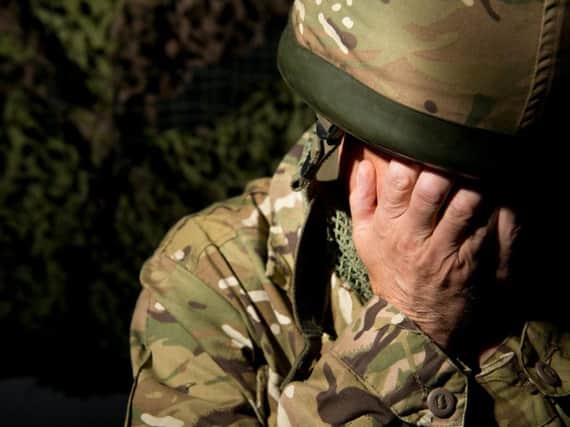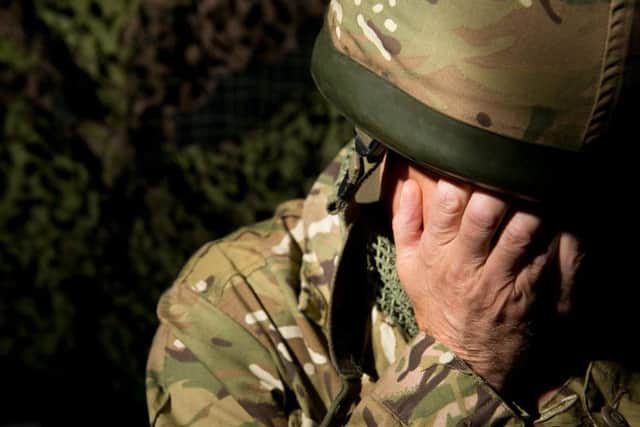Special investigation: The hidden cost of war


A Johnston Press investigation has found no comprehensive official records are kept of the number of British ex-servicemen and women taking their lives.
In stark contrast to allies such as the United States and Canada who monitor their ex-military personnel for life, the United Kingdom has no reliable system in place to track suicides among the nation’s 2.6 million veterans – despite evidence that thousands struggle with serious mental health problems, including Post Traumatic Stress Disorder.
Advertisement
Hide AdAdvertisement
Hide AdJP Investigations wrote to the 98 coroners in England and Wales, along with their equivalents in Scotland and Northern Ireland, to ask for records over the last three years on the number of suicides committed by people who had served in the armed forces.


Just one was able to provide the data while 25 others replied saying no such information was kept or could not be searched for. Several coroners backed calls for such data to be kept in a readily-accessible format.
In response to a request made under the Freedom of Information Act, the Ministry of Defence told JP Investigations that it “does not hold information on the causes of death of all UK Armed Forces veterans”.
A senior NHS executive acknowledged earlier this month that “we can do better” on collecting data on veterans taking their own lives.
Advertisement
Hide AdAdvertisement
Hide AdSuicide remains rare among military veterans and the last comprehensive study, completed in 2009, found the overall rate was comparable to the general population. Separate studies conducted among veterans of the Falklands War and the Gulf War found risk of suicide was lower than for the population as a whole.
But, despite the yawning gap in official records, there is evidence that a disturbing number of ex-soldiers - in particular among those who fought in the most recent conflicts in Iraq and Afghanistan - are taking their own lives or attempting to do so.
Johnston Press has established that at least 16 veterans are feared to have committed suicide since January, of who at least seven are known to have fought in Afghanistan and Iraq.
Relatives, campaigners and professionals – including two coroners – told our investigation that they believed official figures for the number of suicides were vital to understanding the extent of serious mental health problems among veterans and focusing resources to prevent them from taking their own lives.
Advertisement
Hide AdAdvertisement
Hide AdA MoD spokesman said: “While rates of suicide are significantly lower in the Armed Forces than the general population, any suicide is a tragedy for the individual, their family, friends and colleagues and we take each case extremely seriously.
“The reasons people take their lives can vary and are not necessarily linked to their service.
“Help is available for serving personnel, their families and veterans, including through the two 24-hour mental health helplines provided by Combat Stress.”
Contact the helpline on 0800 138 1619 or visit combatstress.org.uk
Andrea's plea at hidden epidemic
Advertisement
Hide AdAdvertisement
Hide AdAndrea Tierney lost her partner Simon McGovern, who was a veteran suffering from PTSD, to suicide in March 2016.Andrea, who was living in Blackpool and working in Preston as a barber at the time of the tragedy, was shocked and devastated and believes suicide among veterans is a hidden epidemic.She says: “We need to know the true figures for veteran suicides so we can understand the extent of the problem.“The Government might then realise there is a massive black hole when it comes to veterans and PTSD.”
‘Coroners are reluctant to give a verdict of suicide’
The “British stiff upper lip” attitude to death and the UK system of recording deaths means there is not enough accurate information about suicides in this country.That’s the view of Dr Walter Busuttil, consultant psychiatrist and medical director at Combat Stress, the UK’s leading charity for veterans’ mental health.He explains: “In the UK, coroners are reluctant to call something a suicide unless it is obvious. They will often go with a narrative verdict.“What this means is that we haven’t got any accurate information relating to the rate of suicides among anybody in this country.“Other countries record more accurate suicide studies.“The UK has a different system and we have a different culture and that is a big problem.“It is cultural and indicative of the ‘British stiff upper lip’. “If a veteran dies unnecessarily, we have failed that person.“At Combat Stress we would like to see things clarified and simplified to make it clearer what the real underlying rate of suicides is among veterans.“For me, if there is even one suicide of a veteran in this country that we do not know about, that is a tragedy.”Sue Freeth, chief executive at Combat Stress, agrees that veteran suicide rates remain an unknown area because of the UK system of recording deaths.She says: “The UK coroner system is peculiar and unlike any other country. “There is not a mechanism we are aware of in England to accurately record the deaths of veterans by suicide so we don’t know if the rates are higher or lower than their civilian peers. “As a charity working with veterans with complex mental health issues, we believe it’s important to know how many veterans have taken their own lives so we can assess if the issue is getting bigger. “Having accurate facts and figures about veteran suicides will help us to monitor any significant trends. “I think it is important and useful to have central data about veteran suicides and this is something the Chief Coroner’s Office could be asked to identify and collate. “We have got a lot of data about veterans but data about suicides of veterans is the missing piece of the jigsaw.”